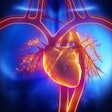Cardiac Imaging: Page 58
NY Times column mulls merits of calcium CT scans
April 4, 2018
POCUS helps handle out-of-hospital cardiac arrest
April 1, 2018
Canon shows 4D features for Aplio i900 at ACC show
March 13, 2018
Bone density scans help identify cardiovascular disease
March 12, 2018
Lantheus touts cardiac PET tracer study at ACC
March 12, 2018
ACC: PET/CT calcium scans could foretell cardiac events
March 12, 2018
Canon nets FDA OK for new edition of 3T MRI scanner
March 11, 2018
ACC: PET tops SPECT for severe coronary artery disease
March 11, 2018








